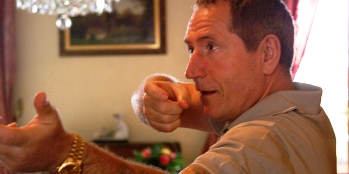Sometimes you expect little from a film, and leave the theater stunned and gasping. Walking down 2nd Avenue in New York City after Thieves By Law -- the Russian phrase for organized crime groups -- every overweight light-skinned male is suddenly a Russian threat. The film had swamped my zone, turning easy-going 2nd Avenue into one dangerous stretch. And this from a film I expected little from.
At the very beginning, this documentary lays out its goal: to pull back the veil on the Russian mafia. Did it succeed? Well, yes and no. Thieves By Law gives us the history, rooted in the Communist era, the steady growth and explosive expansion after the Soviet Union dissolved, and ending during today's less violent era -- relatively less violent. It covers the history well.
On the other hand, there is some fuzziness in this film, and numerous holes in the narrative. For instance, how can these mobster kingpins talk as openly as they do? And I wondered why the director, Alexander Gentelev, didn't question the mobsters harder? Why didn't he challenge their exaggerations, push them on their understatements? Of course we know exactly why. If Gentelev had, there would not have been a film. Possibility not a Gentelev.

On the other hand, since this is a subject that one normally has a basic understanding of -- organized crime being a popular subject in the media -- one can normally fill in the film's blanks, downsize the mobsters' exaggerations, and translate the oblique. What's revealed allows us to grasp the truths that are not said explicitly. The veil that is left, then, is no hindrance to understanding the story.
My question when this film began was this: is the Russian mob any different from other mobs? If it's not, there is no reason to see the film. Is it different? Well, again, yes and no.
Violence or the threat of violence is an essential tool for all crime syndicates, excluding those specializing in only "white collar" crimes. You could say, however, they employ a different kind of violence. Regardless, fear is their currency. Fear you will lose your life or your money, or both. And prisons are mob training schools, solidifying their dark view of the world and teaching the "students" the secrets of the trade. Prisons are also, in Russia as well as everywhere, the great networker where future "soldiers" are recruited and organizations are initially formed. Finally, in Russia and throughout the world, criminal gangs often direct the most violence against other gangs, using violence to acquire a larger "market share."
Yet, the Russian mob is also different. Different because Russia is different, has a different history -- a very different recent history.
When the Soviet Union imploded at the end of the 1980s the resulting power vacuum allowed the mob to acquire enormous power extremely quickly. With the government unable to enforce the laws, with the old Soviet power structure discredited, with business establishments transitioning from collectives to private ownership, this was a prime opportunity for the mob to grab power. And seldom has organized crime become such a powerful societal force and seldom has the violence been as extreme as in Russia.
With the Russian mafia growing stronger, the dominant gangs moved from the basic protection rackets to partnering with legitimate businesses. Whereas in the 1990s, we are told in the film, mobsters tended to kill each other, by the 2000s they were killing businessmen. Well, sort of. The businessmen were often themselves gangsters, or at least partners of gangsters. The Mafia had penetrated nearly every sector of the economy - banking, energy, trade companies, etc.
Thieves By Law delivers a stunningly close-up picture of three major mafia honchos. Their worship of materialism, their view of government as a criminal organization, like their organization, their belief businessmen are corrupt, like they are -- actually, the gangsters claim to be less criminal and corrupt. They mobsters range from chillingly ice-cold to hard but smart to quite social and relatively relaxed. But that is the surface, underneath they are all ruthless with a ethics that that the larger society calls no ethics.
Although most professional criminals throughout the world rationalize their criminal actions, in Russia this rationalization has always been easier. For 60 years those who conducted business outside of the Communist structure were labeled criminals. A simple trader could be a criminal. Anyone could be a criminal. And force was a tool readily used by the government against its citizens -- Stalin's gulags the most horrendous example. With such a history, combined with a society not only in radical transition but in mayhem, values are fluid and morality is too often seen as too expensive.
Whereas I was concerned Thieves by Law would be a stale rehash of the old organized crime story, the film delivers an intimate picture of Russian mafia bosses -- closer and more complete than I have ever seen -- in the context of unique Russian conditions. It's a cinematic trip that will suck you into the story -- into several mafia bosses lives, into Russia becoming a "new" Russia, into a society on the bloody road to who knows where. At the end of the film we see that the mafia kingpins have retired. One has turned to religion, another to enjoying the easy life and his family, and a third to being a filmmaker. Yet, like everywhere in the world, do mob bosses actually retire? Well, yes and no.
As for seeing this film, that is a definite yes.